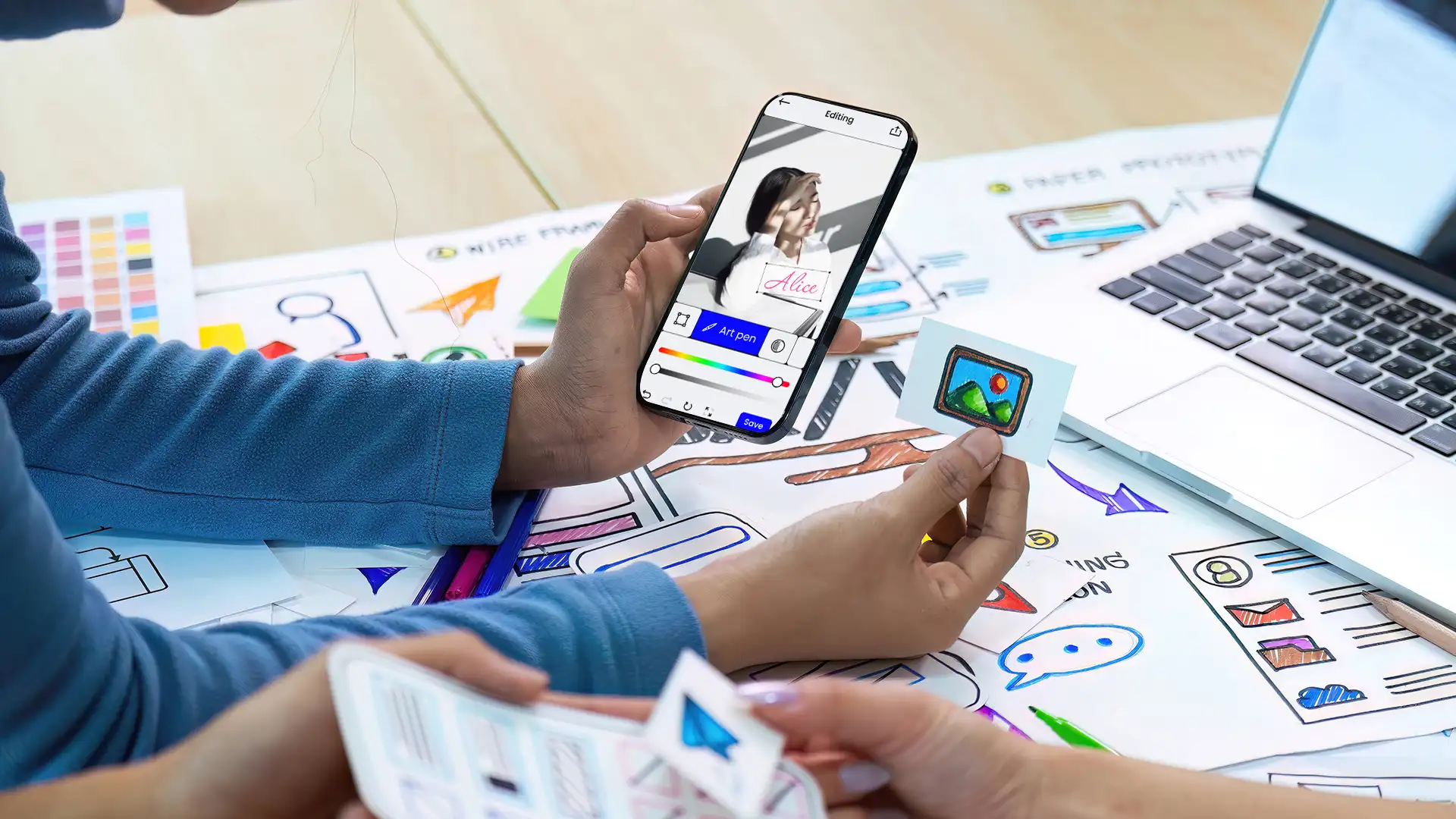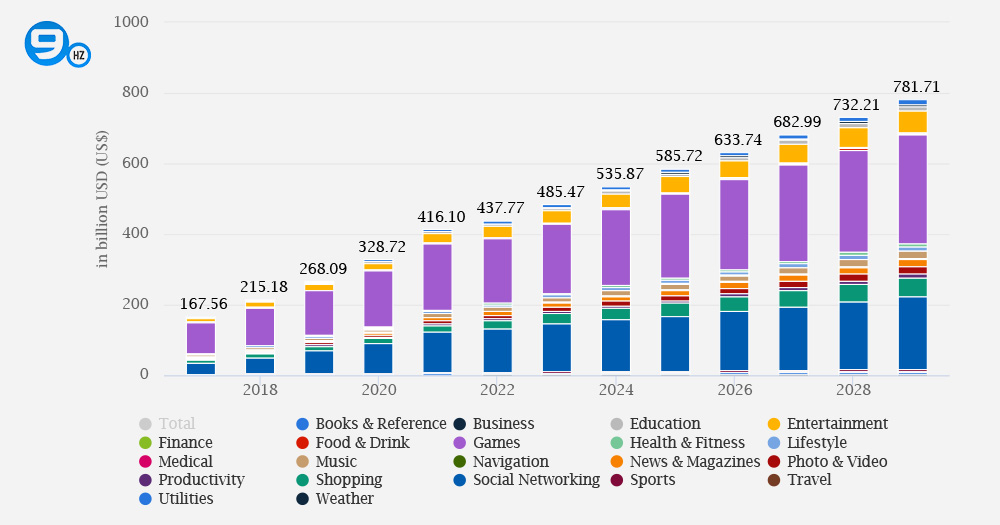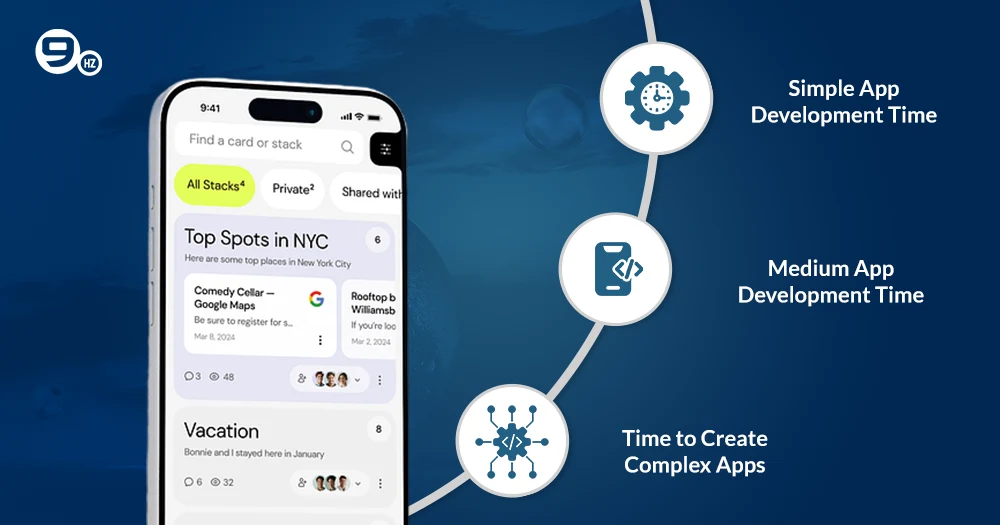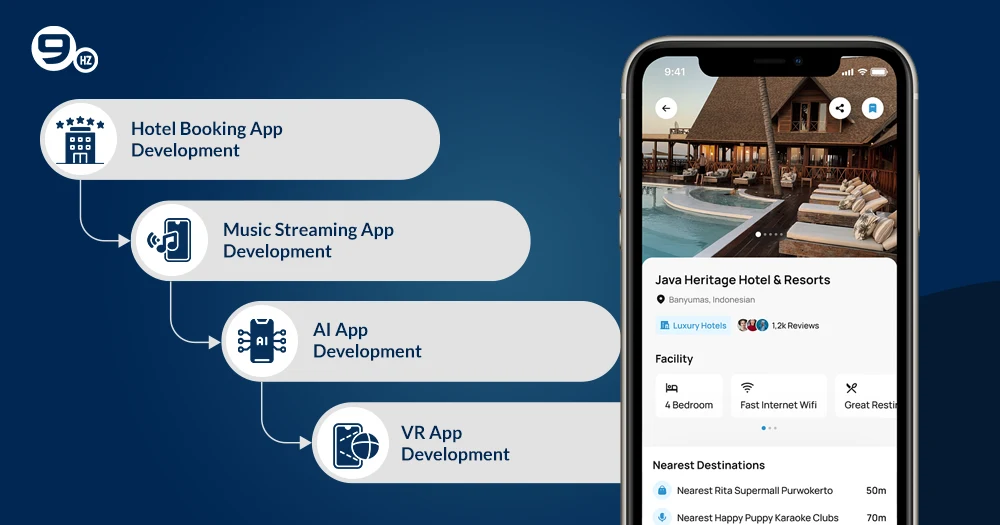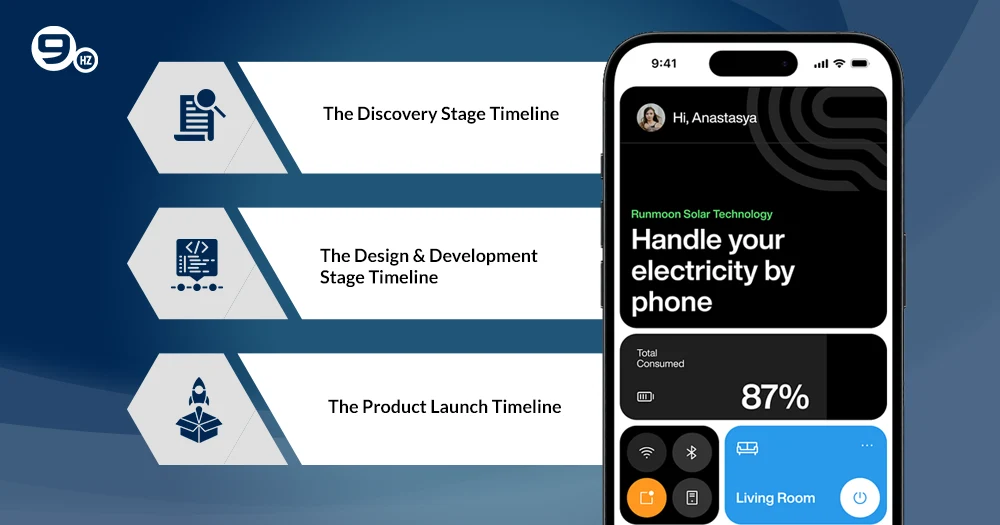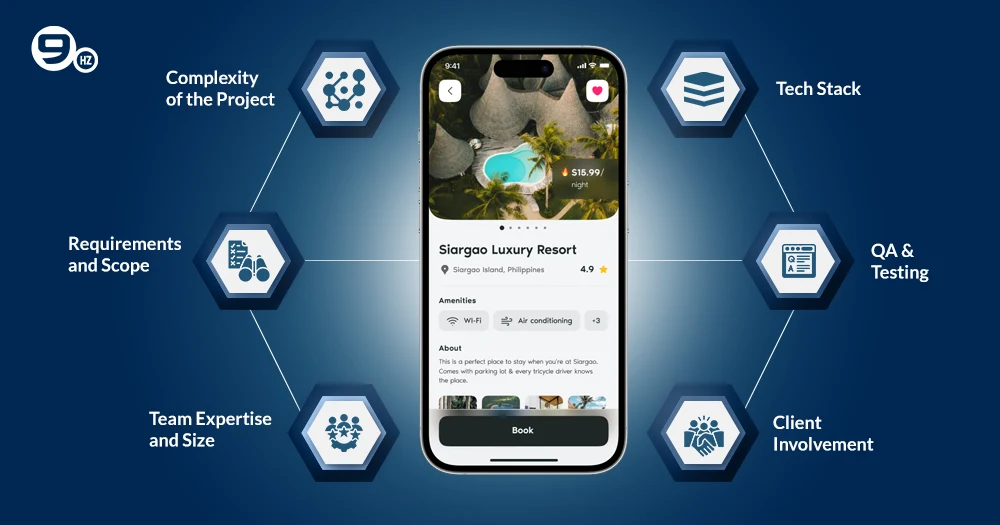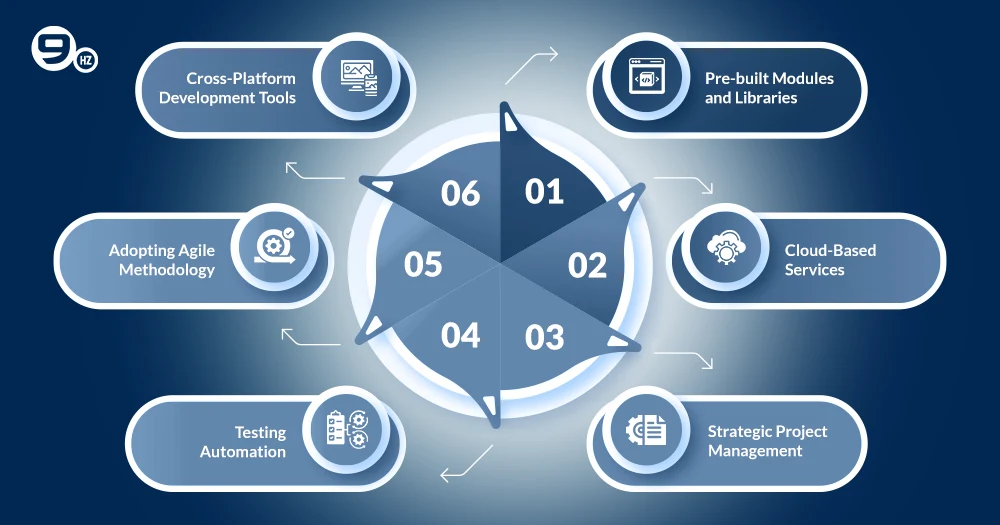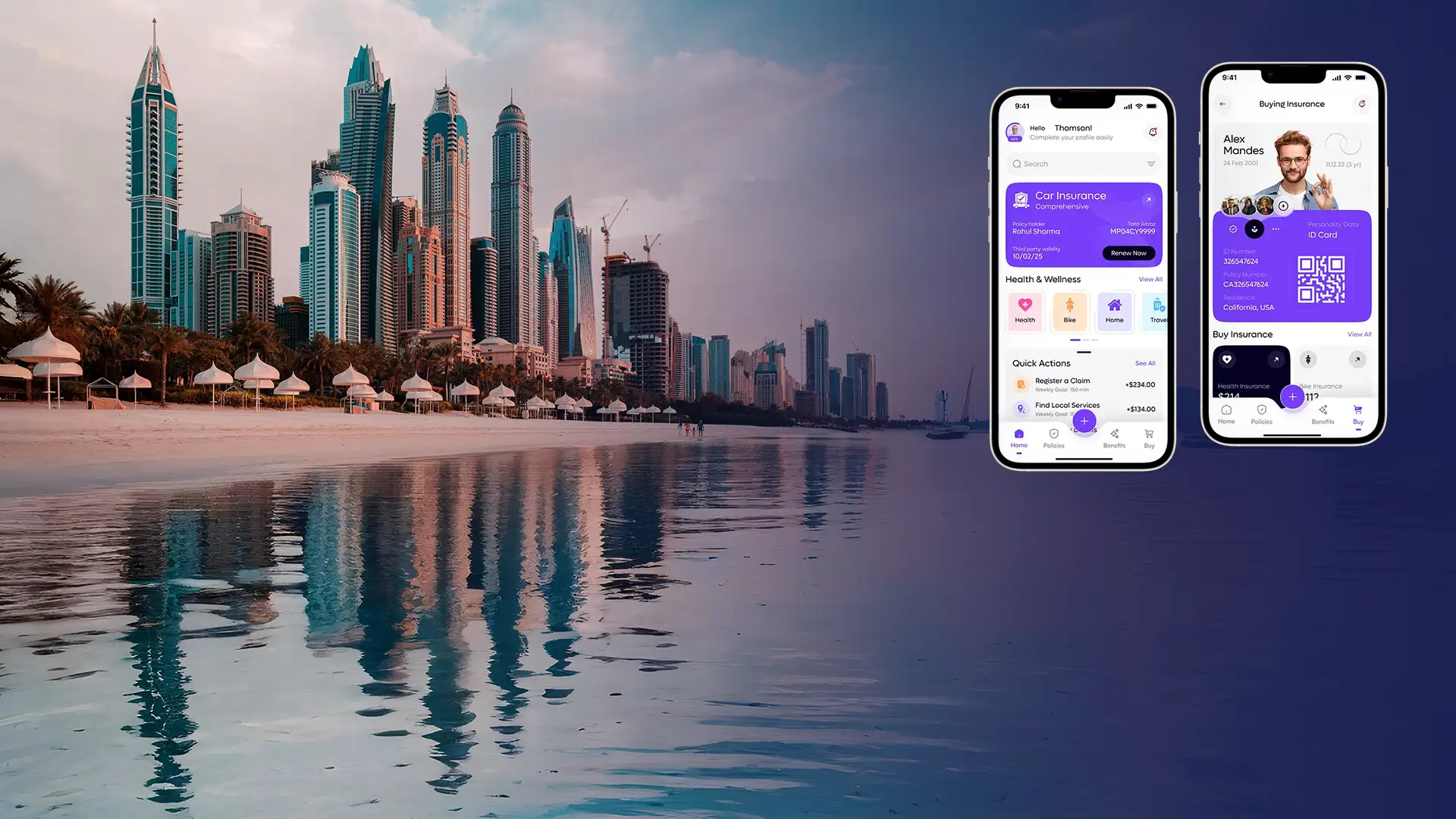To make it big, every business has to have an online presence in the form of an app. But how long does it take to make an app? Generally it takes from 3 months to an year or more to create an app, however the app development process is full of complexities and challenges, starting from ideation to deployment. Many companies are providing custom mobile app development but building a fully functional app is only possible after considering several factors influencing the overall app development timeline. The global mobile app development market, valued at $197.2 billion in 2021, is anticipated to reach $583.03 billion by 2030, growing at a CAGR of 12.8%.
View Source: Statista.com
Since your hard-earned money and reputation are at stake, it is mandatory to verify all the intricacies. This includes considering factors such as app functionalities, tech stack, development team’s location, tools and frameworks, and other similar factors that have a direct impact on the overall mobile app development time in terms of the app development cycle.
The fact is that handling a highly complex and tedious task like mobile app development for businesses can only be done by a trusted and well-experienced mobile app development company in USA like The NineHertz having hands-on experience in app development for decades. The time to build a mobile app highly depends on what company you choose.
So, if you have no technical knowledge and are looking for a company that can help you build an app for your brand, we are here to help you out. For now, continue reading this blog to explore some innovative mobile app ideas and get to know the nitty-gritty of the app development cycle involving factors impacting the app development timeline, key stages of the app development process, factors slowing down the development process, and a lot more.
How Long Does it Take to Develop an App? (by Complexity)
| App Type | Estimated Time |
|---|---|
| Simple App Development | 2 to 4 months |
| Mid-level App Development | 4 to 8 months |
| Complex App Development | 1 year or more |
The answer to how long does it take to make an app depends on factors like app complexity, number of features, choice of tech stack, and project scope. If all these ingredients are in less quantity the app can be developed faster and vice-versa.
The time to develop an app is highly subjective. We have listed the timeframes for various sorts of apps below, however, please note that they are estimations based on previous records and may change in different use cases.
1. Simple App Development Time
The time to build a mobile app with basic features is usually around 2 to 4 months, for example, a utility app with a single use or an app with basic information. Majorly these sorts of apps don’t really require powerful backend connectivity or high-end functionalities, additionally, their user interfaces are quite simple and basic.
2. Mid-level App Development Time
Some mid-level app examples include most e-commerce shops and booking systems or apps based on an application builder. The normal mobile app development time for such mid-level apps with moderate functionality is 4 to 8 months. The user interfaces of these apps are more complex and they have backend integrations too, for example, payment gateways and user authentication.
3. Complex App Development Time
Complex apps like TikTok and Instagram are deeply tech-rooted and require up to a year or more to develop. If you want to make an app like TikTok, you’ll need to integrate advanced functionalities like real-time synchronization, interactivity, database integration, animations, offline mode, and much more. Sometimes they are also built with AR & VR and AI algorithms depending on the app’s nature.
[Also read: How To Make an App Like Airbnb]
How Long Does It Take to Create an App?- Categories
| App Development Type | Mobile App Development Timeline |
|---|---|
| 1. Hotel Booking App Development | From 4 to 9 months |
| 2. Music Streaming App Development | From 6 to 12 months |
| 3. AI App Development | From 8 to 14 months |
| 4. VR App Development | From 10 to 18 months |
Applications’ complexity, features, and other influencing factors can have a significant impact on their development time. A rough estimate of the types of applications is provided below:
1. Hotel Booking App Development
Projected Time Duration: 4 to 9 months
- Main Features: User registration, booking system, payment gateway, search and filter options, admin panel, and, user reviews.
- Team Structure: Generally, 4 to 6 team members, including front-end and back-end developers, a UI/UX designer, and QA specialists.
- Development Complexity: Moderate. Additional complexity arises with features such as third-party booking API integration, personalized recommendations, and, dynamic pricing.
Phases of Development
- Planning and requirements gathering: 2 to 4 weeks
- Designing: 4 to 6 weeks
- Coding: 12 to 20 weeks
- QA & Testing: 4 to 7 weeks
- Deployment: 2 to 4 weeks
2. Music Streaming App Development
Projected Time Duration: 6 to 12 months
- Main Features: Music library, user accounts, search and filter, playlists, streaming, offline access, social sharing, and, personalized recommendations.
- Team Structure: Generally, 5 to 10 team members, including frontend and back-end developers, a UI/UX designer, audio streaming experts, and Testing & QA specialists.
- Development Complexity: High. Involves real-time streaming, handling extensive data, and ensuring minimal latency. Adding Digital Rights Management (DRM) and handling licensing adds further complexity.
Phases of Development
- Planning and requirements gathering: 3 to 5 weeks
- Designing: 5 to 9 weeks
- Coding: 16 to 24 weeks
- Testing & QA: 6 to 8 weeks
- Deployment: 3-5 weeks
3. AI App Development
Projected Time Duration: 8 to 14 months
- Main Features: User accounts, AI model integration, data processing and analysis, real-time feedback, and, predictive analytics.
- Team Structure: Typically, 8-12 members, including front-end and back-end developers, AI/ML specialists, data scientists, a UI/UX designer, and testers.
- Development Complexity: Very High. Involves multifaceted algorithms, machine learning model training and integration, and handling extensive databases, AI Development Services become crucial. This level of complexity requires core expertise in AI and ML technologies, ensuring that the app performs efficiently and meets advanced technological demands.
Phases of Development
- Planning and requirements gathering: 4 to 6 weeks
- Data gathering and preparation: 6 to 10 weeks
- Model development and training: 12 to 20 weeks
- Designing: 5-8 weeks
- Coding: 16 to 24 weeks
- QA: 6-8 weeks
- Deployment: 4 to 6 weeks
4. VR App Development
Projected Time Duration: 10 to 18 months
- Main Features: User accounts, real-time rendering, immersive 3D environments, interactive elements, motion tracking, and, VR device compatibility.
- Team Structure: Generally, 10 to 15 members, including frontend and back-end developers, VR specialists, 3D artists, a UI/UX designer, and QA testers.
- Development Complexity: Very High. Requires 3D modeling, advanced graphics programming, and ensuring compatibility with various Virtual reality devices. Performance optimization is critical.
Phases of Development
- Planning and requirements gathering: 4 to 6 weeks
- Designing and 3D modeling: 8 to 12 weeks
- Coding: 20 to 30 weeks
- Testing & QA: 8 to 10 weeks
- Deployment: 4 to 6 weeks
It is important to note that these estimates are approximate and can vary depending on the particulars of each project, the efficiency of the team, and other external factors. In order to efficiently manage these timelines, effective communication and better management practices play a major role.
[Also read: How to Build an App like Amazon]
Time to Make an App on Various Stages
| Stage Name | Timeline |
|---|---|
| The Discovery Stage |
|
| The Design and Development Stage |
Basic Apps: 1 to 2 months, Mid-Level Apps: 2 to 4 months and Advance Apps: 4 to 9 months |
| Product Launch Stage |
|
The mobile app development timeline to bring an app from ideation to launch affects every step of the software development process. This process considers several specific tasks, challenges, and phases. Each app development phase has durations that we are listing down below:
1. The Discovery Stage Timeline
The discovery phase involves a lot of in-depth research and brainstorming. Usually, this stage takes 6 to 8 weeks to complete. Following are the fundamental questions that you must ask during the mobile app development timeline:
How Long Does it Take to Research the App Idea?
The research on average takes around 1 to 2 weeks. By the term research, we mean the following:
- Market research and analysis
- Value proposition
- Proto personas
- CJM
The reason why research is very important is because it enables you to see the feasibility and longevity of your app idea. You can check whether or not your app has a potential market. Research also helps in uncovering whether the market is bustling with similar ideas or if the costs might lead to stretching the budget. It is always better to do a little brainstorming and find the nitty-gritty of the app idea to judge its long-term potential.
This analysis is also helpful in prioritizing the needs and defining feature sets along with ensuring that the business goals are met. All and all we can say that conducting research for your app idea is important for a diverse range of things like identifying market demands, understanding user requirements, assessing feasibility, and analyzing fellow competitors.
How Long Does it Take to Validate the Idea?
The validation part comes just after the research. Fully validating your app idea takes up to 1 week. But if you wonder what happens during this phase, then let me answer.
Under this phase, the knowledge gathered during the research phase is processed and implemented. This involves conducting interviews with potential customers, checking hypotheses, and testing app flow. This way, we are making the app idea less fluid and more established.
Here are the outcomes of the validation phase:
- Prototype personas improved
- Classic or lean business model canvas
- Market strategy
Research and validation are optional, but highly recommended. If you have already interacted with your potential customers, verified the hypothesis, and taken feedback, then the validating step can be skipped.
How Long Does it Take to Create a Product Strategy?
Product strategy is a much broader term that helps in describing your business goals and how you will be reaching them with your product. Developing a product strategy generally takes around 2 weeks to complete and includes the following:
- Product roadmap
- Technical designing
- Timeline calculation
- Cost determination
The primary reason why product strategy is important is because it offers a clear vision and roadmap for app development, aligns team goals, and ensures resources are utilized in an efficient manner. It helps in achieving business goals by addressing market needs, prioritizing features, facilitating decisions, and delivering value to users.
How Long Does it Take to Prototype the App?
1 week is generally the timeline to build a clickable prototype. It involves creating an early, simplified version of the application to conceptualize its design, functionality, and feature set. Also, tasks like drawing interfaces, creating wireframes, and developing interactive models are performed under this stage.
Prototyping is overall helpful in making the stakeholders understand the concept of the app, identify potential issues, and gather relevant feedback. Prototyping also promotes iterative testing and refinement.
Developers can collect useful information to identify potential problems by allowing users and stakeholders to intermingle with the prototype. This valuable feedback helps in making sure that the product meets the user’s expectations and minimizes the risk of costly corrections figured out later in the development stage.
How Long Does it Take to Validate the App Prototype?
For validating your prototype, you must test it with at least 5 or more users in order to get feedback and find valuable insights which are listed below:
- Level of user satisfaction with the features
- Level of user interaction with the product
- Level of ease to use your product
- Level of clarity of the navigation
This takes around 1 week to complete and is called one-cycle feedback. Depending on the number of feedback cycles, the final time may change.
2. The Design and Development Stage Timeline
After the discovery stage comes the design and development stage. You can save a lot of time for this stage if you perform the earlier stage precisely by quickly prototyping your app, testing it with genuine users, and making changes based on the feedback.
How Long Does it Take to Design the App?
The designing part takes a lot of portion of mobile app development time. App design that involves user experience and user interface is an extremely important stage of the entire development process. Additionally, it is one of the most unpredictable and time-consuming tasks of the development cycle.
Their biggest reason for that is the fast-paced tech ecosystem that changes rapidly. Implementing the lean UX design process is a great way to make the design process less unpredictable and more constant.
Generally, the design stage takes from 2 to 3 months.
This stage involves crafting detailed frameworks and laying the structural foundation of the application. Accurate prototyping helps in giving a realistic preview of the overall look and feel of the application.
However, design complexity is an important factor affecting timelines to a great extent. If you want to save your time and money, one of the great ways is to use UI kits for a few basic screens.
How Long Does it Take to Code the App?
The time taken to code an app depends on multiple factors. This includes app complexity, number of features, tech stack, and the expertise & experience of the development team. Here’s a general breakdown:
| App Type | Features | Time to develop |
|---|---|---|
| Basic Apps | Simple UI, basic functionalities and minimal backend | 1 to 2 months |
| Mid-level apps | Moderate user interface, standard functionalities, and third-party integrations | 2 to 4 months |
| Advanced level apps | Complex user interface, advanced functionalities and third-party integrations | 4 to 9 months |
Let’s explore in detail
Basic Apps
Estimated Coding Time: 1 to 2 months
Basic apps have simple user interfaces and basic functionalities. Some of the examples include contact forms and static pages. Just the coding part of these apps (excluding the ideation, research, and design) takes around 1 to 2 months. The less complex code needs less time for testing and development.
Mid-level Apps
Estimated Coding Time: 2 to 4 months
As far as mid-level apps are concerned, they have more complex interfaces with standard functionalities. The coding part takes around 2 to 4 months for such sort of apps with mid-level features and functionalities. The development time increases due to a more complex database and the need for external integrations.
Advance Apps
Estimated Coding Time: 4 to 9 months
Talking about advanced apps that have highly complex user interfaces and advanced functionalities, such apps usually take around 4 to 9 months for the coding part to be completed. It takes from 4 to 9 months to code advanced apps. The extended time is an outcome of factors like code complexity, multiple testing and QA stages, and the need for optimization.
3. The Product Launch Timeline
As soon as the app is ready, the time to launch the product finally comes. Launching a product strategically is always a tough nut to crack. We generally divide the launching phase into two parts – beta and alpha releases. The pre-release version is the alpha release version of the app and is performed by testers within the organization.
The beta version of the app is dedicated to the end users whose amount is much larger than the users of the alpha version. Google Play Store and App Store have different reviewing processes. A chain of submissions and reviews takes place. Considering all the above factors, we can say that the pre-launch stage may take roughly from 2 weeks to 1 month.
Regarding the reviewing process of both app stores, Android has a moderate review process while Apple has a far more detailed review process. A team of reviewers manually conducts the review process in Apple, while Android uses an algorithm to pre-analyze your app. So, the submission period is dependent on the use case. In Apple’s App Store Review Page, it is mentioned that the apps will be reviewed within 24 hours, however, it may take longer in some cases.
Google on its help page says that the app reviews can take up to 7 days or more in exceptional scenarios. This is generally true for new developers or those with apps requiring more detailed reviews. Publishing happens after a couple of days of approval on both platforms.
You may also like to read: How to Build an App Like Taskrabbit
Key Factors Influencing App Development Timelines
Here are the six most important key factors that influence the time to build a mobile app:
1. Complexity of the Project
Depending on the complexity of features and the need to integrate with third-party services or existing systems, development time will vary.
2. Requirements and Scope
For streamlining the development process, detailed and stable requirements are necessary, while scope changes can cause significant delays.
3. Team Expertise and Size
Development speed and efficiency are greatly influenced by the skill level and experience of the development team, as well as the size of the team.
4. Tech Stack
The development timeline can be affected significantly by the platform and technology stack chosen.
5. QA & Testing
A stable and reliable app requires comprehensive testing and quality assurance, which can take a considerable amount of time.
6. Client Involvement
It helps prevent unnecessary delays when clients or stakeholders provide timely feedback and approvals.
Ways to Speed Up the App Development Process
Here are some ways to speed up the mobile app development process, so have a look:
1. Cross-platform Development Tools
You can use significant development time if you make use of cross-platform development tools like Flutter, React Native, and Xamarin which allow you to write code once and deploy it on both iOS and Android platforms. This way you can streamline the coding process and eliminate maintaining two separate teams for each platform. This approach can be particularly beneficial when utilizing iOS app development services and Android app development services.
2. Adopting Agile Methodology
Agile development brings iterative progress that allows for faster releases with more flexibility. Regular sprints and reviews act as tools fostering continuous improvements and enhancements in the development processes to meet user’s requirements.
3. Testing Automation
With testing automation, one can quickly identify bugs and errors so that they can be fixed promptly. This helps in accelerating better and faster development cycles. Automated tests are independent of manual intervention providing rapid feedback and maintaining code integrity.
4. Strategic Project Management
There are various project management tools available in the market like Trello, JIRA, and Asana that can be used to track progress, handle tasks, and collaborate efficiently. These can be leveraged to streamline the development process and bring efficiency that ultimately helps accelerate the development cycle.
5. Cloud-based Services
A business can significantly reduce the time spent on setting up and managing servers by utilizing cloud-based services for backend infrastructure, data storage, and other functionalities. With cloud solutions, developers can focus better as they provide reliability, scalability, and ease of integration.
6. Pre-built Modules and Libraries
You can save your time by leveraging pre-built modules, frameworks, and libraries and avoiding the need to create components from scratch. This way developers can feel free to integrate solutions efficiently that are trial and tested and focus on other important app features.
Conclusion: How Long Does it Take to Develop an App
In the end, the answer to “How long does it take to make an app?” largely depends on factors like app complexity, scope, available resources, and design requirements. Choosing a credible mobile app development company would be critical here since an experienced and trustworthy company will not drag your project unnecessarily and get it done within the set timeframe keeping the quality intact.
With more than 15 years of experience in app development, we, The NineHertz have served multiple businesses and industries across the globe. Our training programs and workshops also offer great help to our clients in streamlining their processes and increasing productivity. We are not just a company but a culture that breeds success.
Connect with our app development experts to know “how long does it take to develop a mobile app” and kick-start your journey.
FAQs: How Long Does it Take to Make a Mobile App
Q.1 How Long Does it Take to Develop a Mobile App?
We’ll work closely with you to have a detailed discussion about your project, its scope, and requirements to come up with a concrete app development strategy that shows exactly how much time it would take to build your app. Based on that our development team will come in action mode to complete your project from scratch in the set time frame keeping the quality intact.
Q.2 How Much Does it Cost to Build an App?
Generally, app development costs range between $20,000 – $250,000+ for iOS and Android. However, for many complex projects, it can reach up to $350,000. It all depends on the project, its scope, and requirements.
Q.3 Which is the Best App Development Company in the USA?
The NineHertz is among the top app development companies in the USA and nearby countries. They are called app masters with years of experience in this domain. Additionally, they have expert developers handpicked from the industry’s finest talent pool. All these points make The NineHertz a well-deserving candidate for your app development needs.
Q.4 What is the Benchmark to Measure the Success of a Business App?
User Engagement, user behavior, and user retention are three major pillars of measuring the business app’s success or failure. These three metrics measure the success of an app by reflecting the active user interaction with the app, the quality of their interactions, and their likelihood to continue using the app over time, indicating long-term value and satisfaction.
Great Together!
